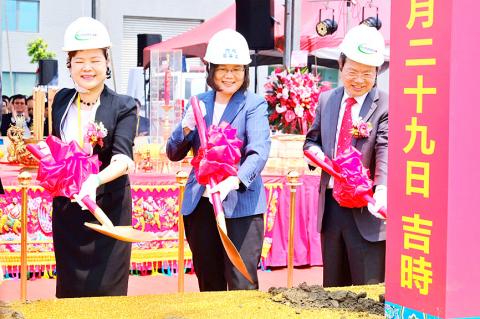Super Micro Computer Inc is to invest up to NT$10 billion (US$323.7 million) in Taiwan and add more than 2,000 jobs, President Tsai Ing-wen (蔡英文) said yesterday at a groundbreaking ceremony in Taoyuan’s Bade District (八德).
As part of a plan to increase production in Asia, the San Jose, California-based information technology company invested NT$2 billion for phase one of the construction project at the Bade technology park.
The company develops servers and storage units that are energy efficient and environmentally friendly, Super Micro founder and chief executive officer Charles Liang (梁見後) said.

Photo: CNA
“A lot of our equipment can now last for 12 years, this means fewer renewals and therefore less electronic waste and heavy-metal pollution, which is why we want to expand our production and sell globally,” Liang said. “This is only the second phase, there will be a third, a fourth and a fifth.”
Foreign investment in Taiwan totaled NT$536.5 billion last year, a year-on-year increase of 31 percent and the highest in recent years, Tsai said, citing Ministry of Economic Affairs data.
“Our efforts to relax regulations, support enterprise reorientation and amend income tax rules have greatly improved the investment environment in Taiwan over the past three years, according to international criteria,” Tsai said.
The World Economic Forum ranked Taiwan 13th for global competitiveness last year and the World Bank ranked the nation 13th for ease of doing business, she said.
Super Micro has operations in Taiwan, Japan, China and the Netherlands that employ about 3,600 people. The company specializes in servers, storage units, rack solutions and networking devices.
In 2012, Super Micro established a technology park in Bade that occupies about 5.7 hectares and employs about 960 people.
Phase two of the construction project would add about 66,000m2 and add jobs in software and hardware development, management, and sales, the Ministry of Economic Affairs said.
Meanwhile, asked about comments that Hon Hai Group (鴻海集團) chairman Terry Gou (郭台銘) made about national defense and arms procurement, Tsai said that the nation’s military actions are dictated by national defense.
“Since 2016, we have emphasized achieving an autonomous national defense, whether in research and development or production, such as constructing indigenous naval vessels. Only when local production is insufficient do we procure arms,” Tsai said. “Chairman Gou should agree with me that no country or people should use weapons to undermine peace.”

Intel Corp chief executive officer Lip-Bu Tan (陳立武) is expected to meet with Taiwanese suppliers next month in conjunction with the opening of the Computex Taipei trade show, supply chain sources said on Monday. The visit, the first for Tan to Taiwan since assuming his new post last month, would be aimed at enhancing Intel’s ties with suppliers in Taiwan as he attempts to help turn around the struggling US chipmaker, the sources said. Tan is to hold a banquet to celebrate Intel’s 40-year presence in Taiwan before Computex opens on May 20 and invite dozens of Taiwanese suppliers to exchange views

Application-specific integrated circuit designer Faraday Technology Corp (智原) yesterday said that although revenue this quarter would decline 30 percent from last quarter, it retained its full-year forecast of revenue growth of 100 percent. The company attributed the quarterly drop to a slowdown in customers’ production of chips using Faraday’s advanced packaging technology. The company is still confident about its revenue growth this year, given its strong “design-win” — or the projects it won to help customers design their chips, Faraday president Steve Wang (王國雍) told an online earnings conference. “The design-win this year is better than we expected. We believe we will win

Chizuko Kimura has become the first female sushi chef in the world to win a Michelin star, fulfilling a promise she made to her dying husband to continue his legacy. The 54-year-old Japanese chef regained the Michelin star her late husband, Shunei Kimura, won three years ago for their Sushi Shunei restaurant in Paris. For Shunei Kimura, the star was a dream come true. However, the joy was short-lived. He died from cancer just three months later in June 2022. He was 65. The following year, the restaurant in the heart of Montmartre lost its star rating. Chizuko Kimura insisted that the new star is still down

While China’s leaders use their economic and political might to fight US President Donald Trump’s trade war “to the end,” its army of social media soldiers are embarking on a more humorous campaign online. Trump’s tariff blitz has seen Washington and Beijing impose eye-watering duties on imports from the other, fanning a standoff between the economic superpowers that has sparked global recession fears and sent markets into a tailspin. Trump says his policy is a response to years of being “ripped off” by other countries and aims to bring manufacturing to the US, forcing companies to employ US workers. However, China’s online warriors